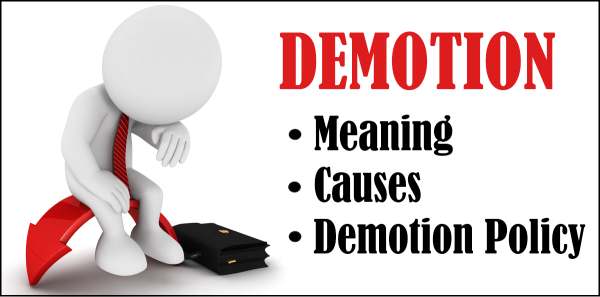Demotion | Meaning | Causes | Demotion Policy

What is Demotion?
Demotion means transfer to a post resulting in lower status, reduced responsibility and lower pay. Demotion is completely opposite to promotion. In an organization, Demotion refers to movement of employee from a higher order to immediate lower order whereby a decrease in pay or responsibility is seen. Demotion becomes a necessity when an employees is unable to perform his duties satisfactorily.
In the words of Dale Yoder, demotion means
“a shift to a position, in which responsibilities are decreased. Promotion is in a sense, an increase in rank and demotion is decrease in rank“.
So, demotion implies lowering down of status, salary and responsibilities of an employee.
Causes of Demotion
Following are the significant causes of demotion:
1. When a person is promoted wrongly.
2. When an employee is not performing well on the job, he may be demoted to a lower job, he may be demoted to a lower job suited to his qualifications.
3. When an employee has lost his capacity to perform his existing work, he may be demoted to a lower job suited to him.
4. When an employee is unable to adjust to any change in technology methods and practices,
5. Demotion can also be made as a consequence of disciplinary action.
6. When some jobs are eliminated due to the merger of certain sections, employees may be asked to accept lower posts.
Essentials of Demotion Policy
Following are the essentials of a demotion policy:
1. The circumstances under which an employee may be demoted should be clearly defined and should be made known to all the employees.
2. If there is any alleged violation, it should be investigated by a competent authority before awarding demotion.
3; A provision to review the situation should be made.
4. If there is any violation of rules, penalties for such violations should be awarded.



